Navigation
Conservation Without Borders: IUCN and German Federal Agency for Nature Conservation Highlight European Examples of Transboundary Conservation
Conservation action involving several countries brings large scale benefits to nature and helps resolve social and political conflicts, a new IUCN (International Union for Conservation of Nature) publication shows.
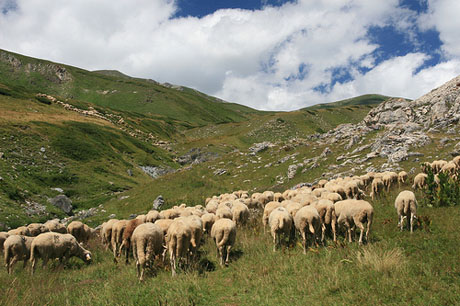 |
| Transboundary conservation brings with it large-scale ecological benefits by protecting extensive natural areas, supporting species migrations and reducing the risk of biodiversity loss. Photograph courtesy of IUCN. |
Conservation action involving several countries brings large scale benefits to nature and helps resolve social and political conflicts, a new IUCN (International Union for Conservation of Nature) publication shows.
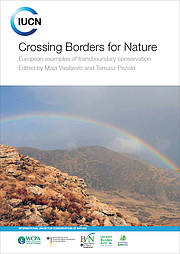 |
| This publication aims to further raise awareness about the value of transboundary conservation, highlighting the many benefits transboundary cooperation generates, while not neglecting the challenges and problems parties encounter when they engage in transboundary initiatives. It is hoped that this publication will be useful to a wide range of policy makers and practitioners involved in transboundary conservation, in particular in the trilateral zone of Albania, Kosovo and Macedonia. Publication: Crossing Borders for Nature. Photograph by IUCN |
The book, Crossing Borders for Nature: European examples of transboundary conservation, draws on cross-border conservation in Europe, highlighting its challenges and benefits. It was published as part of a project led by IUCN and the German Federal Agency for Nature Conservation (BfN) which aims to improve transboundary conservation in the mountainous border zone between Albania, Macedonia and the UN Interim Administration Mission in Kosovo.
“Due to isolation in the past and recent political instability in the area, the border between those countries was strictly guarded for decades,” says Tomasz Pezold, IUCN's Project Officer and one of the publication’s editors. “As a result, it now represents one of the last intact natural sites in Europe with some of the largest populations of species such as bear, wolf and lynx. Cross-border conservation in this region creates the opportunity to preserve this unique natural heritage in its integrity and brings together countries that were isolated for years.”
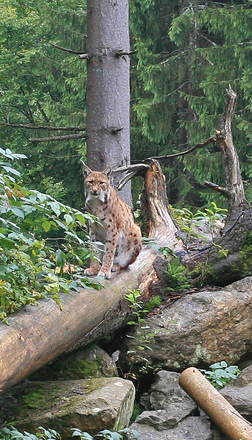 |
| Lynx, Bavarian Forest National Park, Germany. Photograph by Tomasz Pezold, IUCN |
Transboundary conservation brings with it large-scale ecological benefits by protecting extensive natural areas, supporting species migrations and reducing the risk of biodiversity loss.
“Many examples illustrate the benefits transboundary cooperation brings to protect natural and cultural heritage, improving the lives of local communities, reducing tensions and re-establishing friendly neighborly relations,“ says Prof. Dr. Beate Jessel, President of the German Federal Agency for Nature Conservation (BfN). “Although effective cross-border conservation involves overcoming political, economic and social differences across borders, countries and protected area managers increasingly recognize its potential.”
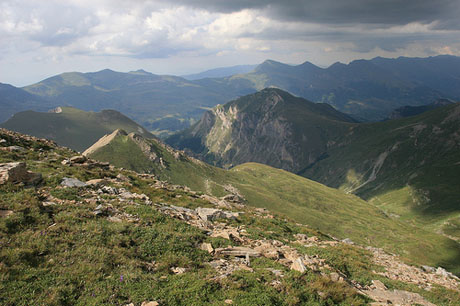 |
| Sar Planina, a mountain range in the Balkans Photograph courtesy of IUCN. |
In the Prespa Lakes area, a region of unique diversity of species and geological structures which lies within Albania, Macedonia and Greece, transboundary conservation action is used as a means to ease political tensions between the three countries.
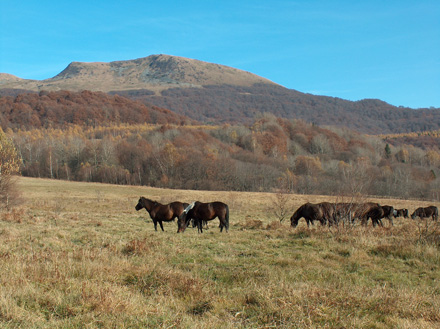 |
| Bieszczady National Park, Poland. Photograph by Zbigniew Niewiadomski |
In the East Carpathians Biosphere Reserve, which includes Poland, the Slovak Republic and Ukraine, cross-border cooperation to protect the area’s nature has helped to rebuild friendly relationships between nations that lost tens of thousands of people in armed conflicts in the 1940s and suffered years of isolation under the Communist regime.
Since the establishment of the Bavarian Forest and Šumava National Parks, located between Prague in the Czech Republic and Munich in Germany, tourism has become an important component of the regional economy, providing additional jobs and income.
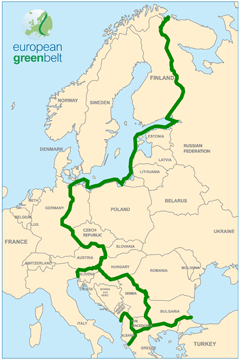 |
| European Green Belt map. Photograph courtesy of IUCN |
“Nature doesn’t stop at borders or man-made boundaries and nor should our efforts to conserve it,” says Maja Vasilijeviæ, co-editor of the publication. “Transboundary conservation is increasingly important in protecting and maintaining large ecosystems and enhancing the socioeconomic development in the areas.”
This news is from IUCN 20 July2011.
Note:
About IUCN and BfN
IUCN, International Union for Conservation of Nature, helps the world find pragmatic solutions to our most pressing environment and development challenges. It supports scientific research, manages field projects all over the world and brings governments, non-government organizations, United Nations agencies, companies and local communities together to develop and implement policy, laws and best practice. IUCN is the world’s oldest and largest global environmental network - a democratic membership union with more than 1,000 government and NGO member organizations, and almost 11,000 volunteer scientists in more than 160 countries.
The German Federal Agency for Nature Conservation (Bundesamt für Naturschutz – BfN) is the German government’s scientific authority with responsibility for national and international nature conservation. BfN is one of the government’s departmental research agencies and reports to the German Environment Ministry (BMU).
Search
Latest articles
Agriculture
- World Water Week: Healthy ecosystems essential to human health: from coronavirus to malnutrition Online session Wednesday 24 August 17:00-18:20
- World Water Week: Healthy ecosystems essential to human health: from coronavirus to malnutrition Online session Wednesday 24 August 17:00-18:20
Air Pollution
- "Water and Sanitation-Related Diseases and the Changing Environment: Challenges, Interventions, and Preventive Measures" Volume 2 Is Now Available
- Global Innovation Exchange Co-Created by Horizon International, USAID, Bill and Melinda Gates Foundation and Others
Biodiversity
- It is time for international mobilization against climate change
- World Water Week: Healthy ecosystems essential to human health: from coronavirus to malnutrition Online session Wednesday 24 August 17:00-18:20
Desertification
- World Water Week: Healthy ecosystems essential to human health: from coronavirus to malnutrition Online session Wednesday 24 August 17:00-18:20
- UN Food Systems Summit Receives Over 1,200 Ideas to Help Meet Sustainable Development Goals
Endangered Species
- Mangrove Action Project Collaborates to Restore and Preserve Mangrove Ecosystems
- Coral Research in Palau offers a “Glimmer of Hope”
Energy
- Global Innovation Exchange Co-Created by Horizon International, USAID, Bill and Melinda Gates Foundation and Others
- Wildlife Preservation in Southeast Nova Scotia
Exhibits
- Global Innovation Exchange Co-Created by Horizon International, USAID, Bill and Melinda Gates Foundation and Others
- Coral Reefs
Forests
- NASA Satellites Reveal Major Shifts in Global Freshwater Updated June 2020
- Global Innovation Exchange Co-Created by Horizon International, USAID, Bill and Melinda Gates Foundation and Others
Global Climate Change
- It is time for international mobilization against climate change
- It is time for international mobilization against climate change
Global Health
- World Water Week: Healthy ecosystems essential to human health: from coronavirus to malnutrition Online session Wednesday 24 August 17:00-18:20
- More than 400 schoolgirls, family and teachers rescued from Afghanistan by small coalition
Industry
- "Water and Sanitation-Related Diseases and the Changing Environment: Challenges, Interventions, and Preventive Measures" Volume 2 Is Now Available
- Global Innovation Exchange Co-Created by Horizon International, USAID, Bill and Melinda Gates Foundation and Others
Natural Disaster Relief
- STOP ATTACKS ON HEALTH CARE IN UKRAINE
- Global Innovation Exchange Co-Created by Horizon International, USAID, Bill and Melinda Gates Foundation and Others
News and Special Reports
- World Water Week: Healthy ecosystems essential to human health: from coronavirus to malnutrition Online session Wednesday 24 August 17:00-18:20
- STOP ATTACKS ON HEALTH CARE IN UKRAINE
Oceans, Coral Reefs
- World Water Week: Healthy ecosystems essential to human health: from coronavirus to malnutrition Online session Wednesday 24 August 17:00-18:20
- Mangrove Action Project Collaborates to Restore and Preserve Mangrove Ecosystems
Pollution
- Zakaria Ouedraogo of Burkina Faso Produces Film “Nzoue Fiyen: Water Not Drinkable”
- "Water and Sanitation-Related Diseases and the Changing Environment: Challenges, Interventions, and Preventive Measures" Volume 2 Is Now Available
Population
- "Water and Sanitation-Related Diseases and the Changing Environment: Challenges, Interventions, and Preventive Measures" Volume 2 Is Now Available
- "Water and Sanitation-Related Diseases and the Changing Environment: Challenges, Interventions, and Preventive Measures" Volume 2 Is Now Available
Public Health
- Honouring the visionary behind India’s sanitation revolution
- Honouring the visionary behind India’s sanitation revolution
Rivers
- World Water Week: Healthy ecosystems essential to human health: from coronavirus to malnutrition Online session Wednesday 24 August 17:00-18:20
- Mangrove Action Project Collaborates to Restore and Preserve Mangrove Ecosystems
Sanitation
- Honouring the visionary behind India’s sanitation revolution
- Honouring the visionary behind India’s sanitation revolution
Toxic Chemicals
- "Water and Sanitation-Related Diseases and the Changing Environment: Challenges, Interventions, and Preventive Measures" Volume 2 Is Now Available
- Actions to Prevent Polluted Drinking Water in the United States
Transportation
- "Water and Sanitation-Related Diseases and the Changing Environment: Challenges, Interventions, and Preventive Measures" Volume 2 Is Now Available
- Urbanization Provides Opportunities for Transition to a Green Economy, Says New Report
Waste Management
- Honouring the visionary behind India’s sanitation revolution
- Honouring the visionary behind India’s sanitation revolution
Water
- Honouring the visionary behind India’s sanitation revolution
- Honouring the visionary behind India’s sanitation revolution
Water and Sanitation
- Honouring the visionary behind India’s sanitation revolution
- Honouring the visionary behind India’s sanitation revolution

